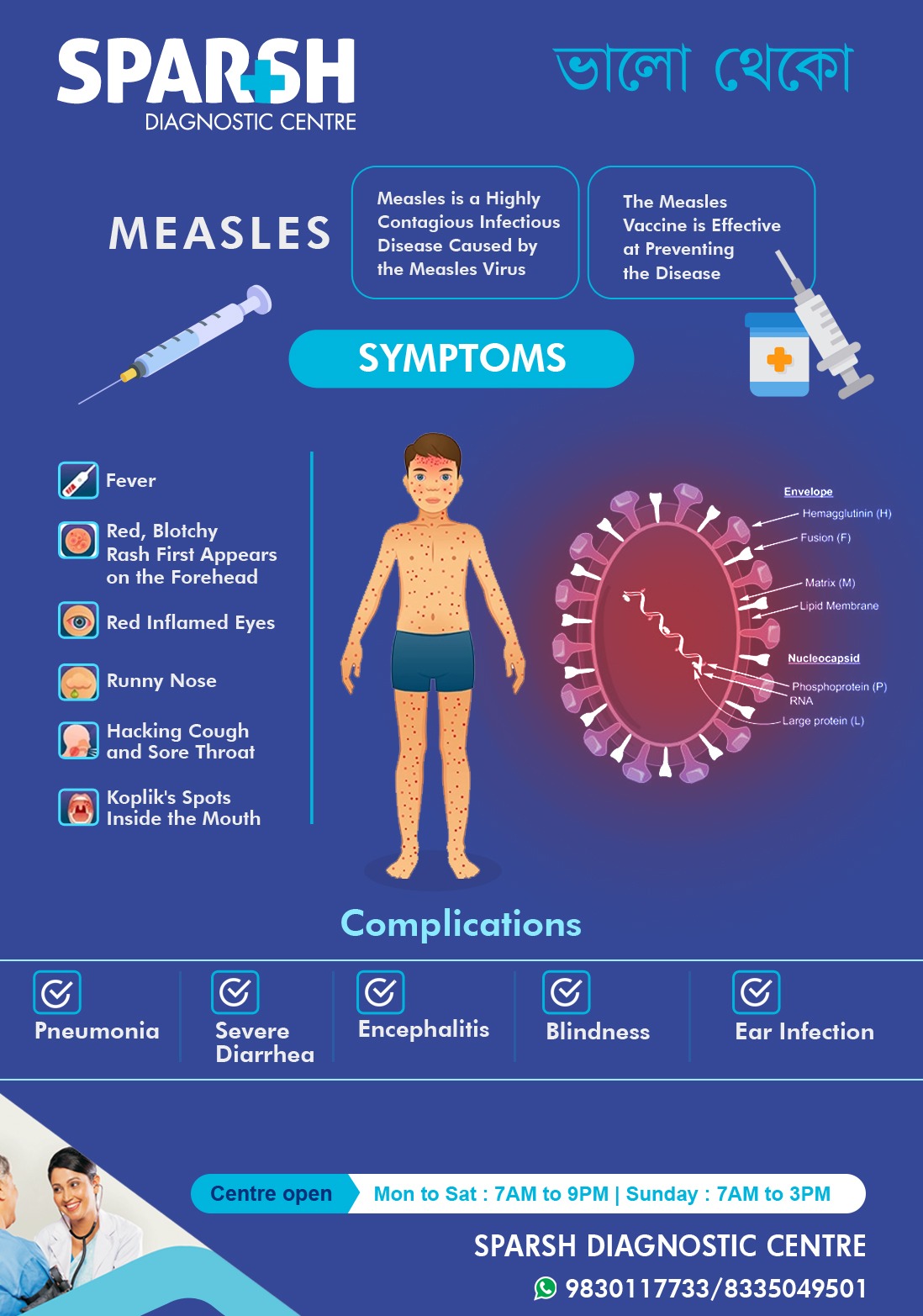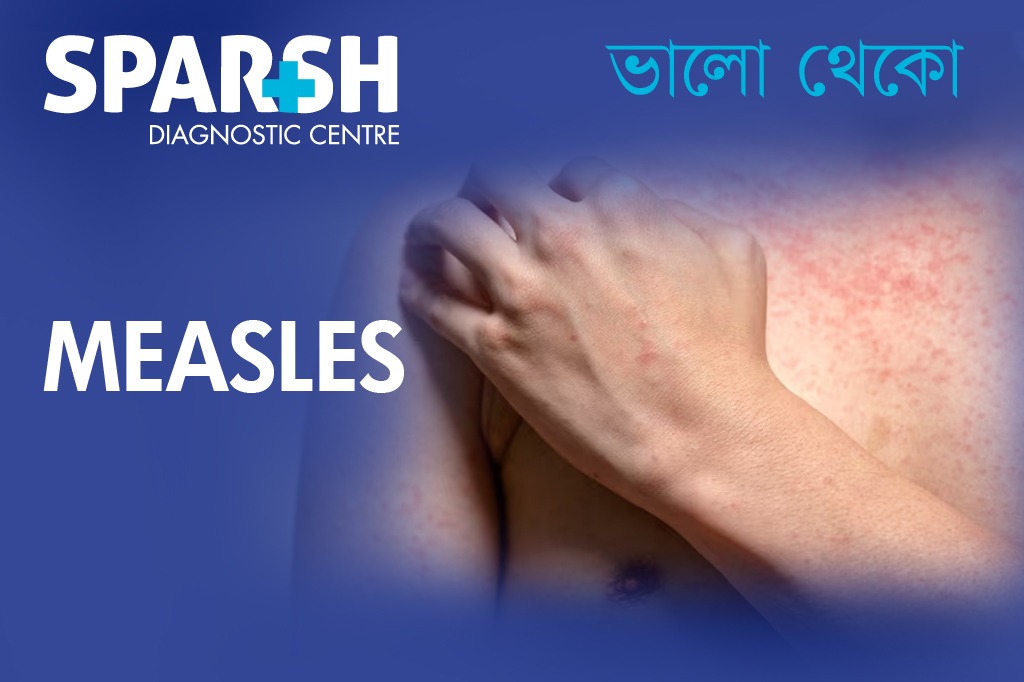Measles is one of the most contagious viral infections in the world, primarily affecting children but capable of infecting individuals of any age. Despite the availability of a safe and effective vaccine, measles continues to pose a significant health threat, particularly in areas with low vaccination coverage. The World Health Organization (WHO) identifies measles as a leading cause of vaccine-preventable childhood mortality.
This blog aims to provide a comprehensive guide to measles — including its causes, symptoms, diagnosis, treatment, prevention, and complications — while highlighting the importance of timely vaccination and medical support.
What is Measles?
Measles, also known as rubeola, is a viral infection caused by the measles virus, a member of the Paramyxoviridae family. It spreads through respiratory droplets when an infected person coughs or sneezes. The virus can remain active in the air or on surfaces for up to two hours, making it extremely infectious.
Key Facts:
Highly contagious viral disease
Spread via coughing, sneezing, or close contact
Incubation period: 10–14 days
Can cause severe complications, especially in young children, pregnant women, and immunocompromised individuals

Causes of Measles
It is caused by the measles virus. Transmission happens when an infected person expels virus-containing droplets into the air.
You can contract measles if:
You are not vaccinated and are exposed to an infected individual.
You have a weakened immune system (HIV, cancer, or long-term steroid use).
You travel to or live in regions with low vaccination rates.
Symptoms of Measles
Symptoms typically appear about 10–14 days after exposure. The illness progresses in stages, with early signs often resembling a common cold.
Common Symptoms:
Fever – often high, beginning 10–12 days after exposure.
Red, blotchy rash – starting on the forehead and spreading downward.
Runny nose and sneezing.
Hacking cough and sore throat.
Koplik’s spots – tiny white spots with bluish centers inside the mouth, unique to measles.
The rash usually appears 3–5 days after initial symptoms and lasts about a week.
Stages of the Infection
Incubation (10–14 days): No visible symptoms.
Prodromal Phase (2–4 days): Cold-like symptoms, mild fever, and Koplik’s spots.
Eruptive Phase: Rash begins, high fever, worsening cough.
Recovery Phase: Rash fades, symptoms subside.
Complications of Measles
While many people recover fully, it can lead to serious complications, especially in children under 5, adults over 20, and those with weakened immunity.
Possible Complications Include:
Pneumonia – the most common cause of measles-related deaths.
Severe diarrhea – leading to dehydration.
Ear infection – may cause permanent hearing loss.
Encephalitis (brain inflammation) – rare but life-threatening.
Blindness – due to vitamin A deficiency or corneal damage.
Diagnosis of Measles
Doctors usually diagnose the infection based on:
Medical history (exposure and vaccination status).
Physical examination (rash, Koplik’s spots, fever).
Laboratory tests (blood test for measles-specific IgM antibodies or PCR testing for viral RNA).
Treatment of Measles
There is no specific antiviral treatment. Management focuses on relieving symptoms and preventing complications.
Supportive Care Includes:
Rest and hydration to support recovery.
Paracetamol or ibuprofen for fever and discomfort.
Vitamin A supplements to reduce severity and prevent blindness.
Cough syrups and saline nasal drops for symptom relief.
Hospitalization in severe cases (especially with pneumonia or encephalitis).
Prevention
The best protection against measles is vaccination.
MMR Vaccine
The MMR vaccine protects against measles, mumps, and rubella.
Given in two doses:
First dose at 9–12 months of age.
Second dose at 15–18 months or at 4–6 years.
Safe and effective for lifelong immunity.
Additional Prevention Tips:
Avoid close contact with infected individuals.
Practice proper hygiene (washing hands, covering coughs).
Isolate infected individuals for at least 4 days after rash onset.
Global Impact of Measles
Despite being vaccine-preventable, measles outbreaks continue in areas with low vaccination coverage.
According to WHO, over 107,500 people died from measles in 2023, mostly children under five.
International travel increases the risk of importing measles to countries where it was previously eliminated.
When to See a Doctor
Seek medical attention immediately if you or your child has:
High fever with rash
Severe cough or breathing difficulty
Symptoms of dehydration (sunken eyes, dry mouth, lethargy)
Exposure to measles in an unvaccinated person
FAQs on Measles
Q1. Can it be prevented?
Yes, measles can be completely prevented with two doses of the measles (MMR) vaccine.
Q2. Is it dangerous?
Yes. Measles can lead to life-threatening complications like pneumonia, encephalitis, and blindness, especially in children.
Q3. Can adults get it?
Yes, adults who were never vaccinated or previously infected are still at risk.
Q4. How long is it contagious?
Measles is contagious from 4 days before to 4 days after the rash appears.
Q5. What is the difference between measles and chickenpox?
While both cause rashes, measles rash begins on the forehead and spreads downward, while chickenpox rash starts on the chest/back and appears in clusters of blisters.
Q6. Can it come back after recovery?
No, once a person recovers from measles, they usually develop lifelong immunity.
Measles remains a serious public health concern, especially for children and those without vaccination. While there is no specific cure, the MMR vaccine provides safe and effective protection. Recognizing the symptoms early, preventing transmission, and ensuring full vaccination are the most effective ways to protect yourself and your community.
At Sparsh Diagnostic Centre, we emphasize the importance of routine checkups, diagnostic support, and preventive care. If you suspect measles or need vaccination guidance, consult our healthcare experts today.
To consult a Doctor at Sparsh Diagnostic Centre, call our helpline number 9830117733.
#BhaloTheko
Disclaimer:
No content on this site, regardless of date, should ever be used as a substitute for direct medical advice from your doctor or other qualified clinician.

![]()






[…] after an infection such as measles, mumps, or […]
[…] symptoms can be mistaken for other illnesses like influenza or measles, making diagnosis challenging without proper […]
[…] Measles, mumps, and rubella viruses (especially in unvaccinated individuals) […]
[…] MMR vaccine (measles, mumps, rubella) protects against mumps-induced […]
[…] Routine immunization against Neisseria meningitidis, Haemophilus influenzae, and measles–mumps–rubella (MMR) can prevent certain forms of meningitis and […]
[…] Rash: Certain viral infections, such as measles, rubella, and dengue, can cause distinctive skin […]
[…] can weaken. This means that some adults are no longer fully protected against diseases like measles, mumps, or whooping cough, despite having been vaccinated as children. Booster shots are therefore […]
[…] A rash, especially when accompanied by fever, could suggest something more severe, like measles or […]
[…] Measles […]
[…] most effective way to prevent rubella is through vaccination. The MMR (measles, mumps, rubella) vaccine is highly effective and is typically administered in two doses, the first […]
[…] prevention. They have been developed for a wide range of infectious diseases, including polio, measles, mumps, rubella, influenza, and hepatitis B. Vaccines are highly effective in preventing these […]
[…] the areas of infectious diseases, measles and chickenpox stand out as two highly contagious diseases that mainly affect children, but can […]